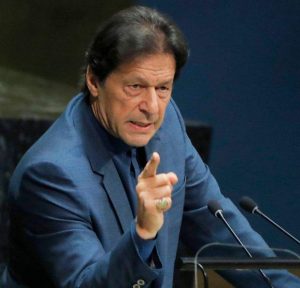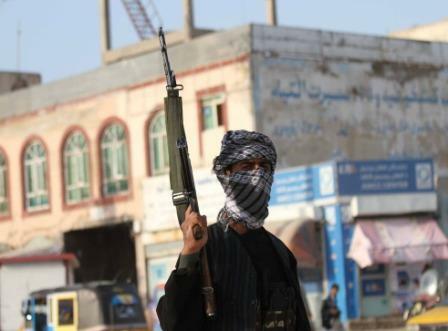

The US President Joe Biden in a speech on Thursday, July 8 announced that the U.S. military would complete its withdrawal from Afghanistan by August 31, nearly two weeks before his earlier deadline of September 11, announced in April.
 The U.S. pull-out from Afghanistan, will end the US’s longest overseas war -which cost the lives of around 2,300 US troops and $825 billion monetarily-is a result of the February 2020 agreement that the Trump administration negotiated with the Taliban in Doha, Qatar.
The U.S. pull-out from Afghanistan, will end the US’s longest overseas war -which cost the lives of around 2,300 US troops and $825 billion monetarily-is a result of the February 2020 agreement that the Trump administration negotiated with the Taliban in Doha, Qatar.
In his latest speech Biden strongly defended his decision to pull U.S. military forces out of Afghanistan, saying the Afghan people must decide their own future, rather than sacrificing another generation of Americans in an unwinnable war.

Biden called on countries in the region to help bring about an elusive political settlement between the warring parties. He said the Afghan government should seek a deal with the Taliban to allow them to coexist peacefully.
And this is what has proved to be the red herring amongst the neighbouring and regional countries. Most of the countries have reacted in a guarded manner over the advances of the Taliban forces in Afghanistan since May, who now controls 162 districts in Afghanistan.
In reality the chaotic and unpredictable conditions in Afghanistan will have a significant impact on the regional geo-politics. For starters, the Iranians have started fishing in the troubled waters by inviting the Taliban leadership for talks in Teheran.
Situation update
Over the last few weeks, the Taliban have captured several districts in Afghanistan including Takhar, the country’s north-eastern province. According to latest figures released by Afghan watchers (till August 3), the Taliban controls 140 provinces, with 151 contested and the government holding 131.
 Heavy clashes are taking place between Afghanistan forces and the Taliban in several Afghan cities. As many as 28 incidents have taken place in the last 24 hours, according to Afghan watchers.
Heavy clashes are taking place between Afghanistan forces and the Taliban in several Afghan cities. As many as 28 incidents have taken place in the last 24 hours, according to Afghan watchers.
At least 40 civilians have been killed and more than 100 injured in the said time period in fighting between Afghan security forces and the Taliban in Lashkar Gah, the United Nations said on Tuesday.

General Sami Sadat, commander of the 215 Maiwand Afghan Army Corps, told residents of Lashkar Gah to get out as soon as they could.
In tactical terms the areas, which Taliban have captured, so far are mostly the rural areas and not connected with the rest of the country through roads or communications.
The fighting is due to increase as it makes advances to control the rural centres and major cities, which are heavily fortified and supported by the US Air Force. Additionally the Taliban enjoy a credible support base in the rural areas as compared to the urban centres.
Iranian initiative
The Taliban-Iranian talks began in January this year, as part of Iranian efforts to broker peace between the Afghan government and other factions.

The latest round of intra-Afghan talks began on Wednesday 7 July morning by a speech from Iranian foreign minister Mohammad Javad Zarif, who warned that the continuation of conflicts between the government and the Taliban will have ‘unfavourable’ consequences for Afghanistan, noting that a return to the intra-Afghan negotiations is the ‘best solution’.
Earlier, Saeed Khatibzadeh, spokesman for Iran’s Foreign Ministry, had said that Taliban is part of the reality in Afghanistan and they are also talking to the Afghan government. During the recent meeting, Zarif discussed the prospect of Afghan people forming an all-inclusive government, including Taliban.
Pakistan’s alarm

Pakistan’s Prime Minister Imran Khan in an op-ed in The Washington Post on 9 June sounded hurt by the accusations of the government in Kabul naming Pakistan as inciting violence in the country.
He further wrote that he would like Pakistan to be ‘a partner for peace in Afghanistan’, which may have ideated from the Indian outreach to the Taliban.
UK’s concern
The UK it seems is more worried about the presence of Al Qaeda and Daesh elements in Afghanistan and not with the Taliban advances.
Sir Alex Younger, former head of MI-6 has cautioned about the terrorism threat to Britain rising, following the US withdrawal and has further said the threat from terrorist groups such as Al Qaeda and Daesh would grow if the UK turns its back on Afghanistan.
 But the UK’s Chief of Defence Staff, General Sir Nick Carter, who served several command tours in Afghanistan, believes the Taliban leadership may have learnt from their earlier mistakes. He maintains that if the Taliban expect to share power, or seize it, then they will not want to be seen as international pariahs.
But the UK’s Chief of Defence Staff, General Sir Nick Carter, who served several command tours in Afghanistan, believes the Taliban leadership may have learnt from their earlier mistakes. He maintains that if the Taliban expect to share power, or seize it, then they will not want to be seen as international pariahs.
Wiser heads amongst the Taliban, especially those who attended the recent peace negotiations, may well argue for a clean break with Al Qaeda in order to secure international acceptance.
India’s Outreach
Indian officials recently met with the Taliban delegation in Doha. This marks a marked policy shift in India’s approach to Afghanistan and Taliban. Besides showing maturity of the policy makers and strategists, the move may accelerate the transition from a non-existent relationship to the inception of a diplomatic engagement, whilst acknowledging Taliban as a critical component of future Afghanistan.

Though Indian policy makers will also be worried about the security threat from the pro-Taliban Pakistani outfits, yet they may have weighed the advantage of engaging with the Taliban and also considered that in future the Taliban might be able to assert pressure on forces inimical to India.
India has always called for ‘an Afghan-led, Afghan-owned and Afghan-controlled process’, and as such, the strategic move to engage with Taliban broadly demonstrates a regional security imperative for India and its efforts to minimise Islamabad’s influence.
Taliban psyche: American view
The Americans have always wondered what fuels the Taliban to fight against a huge military machine despite the odds. Though in reality this has not led to any effort to try to understand the Taliban’s psyche and their commitment.
 However, an American, Carter Malkasian has tried to discuss this in his new book The American War in Afghanistan: A History. Malkasian analyses the Taliban advantage in inspiring Afghans to fight. He opines that their call to fight foreign occupiers, steeped in references to Islamic teachings, resonates well with Afghan identity and psyche.
However, an American, Carter Malkasian has tried to discuss this in his new book The American War in Afghanistan: A History. Malkasian analyses the Taliban advantage in inspiring Afghans to fight. He opines that their call to fight foreign occupiers, steeped in references to Islamic teachings, resonates well with Afghan identity and psyche.
He says that for Afghans, jihad — more accurately understood as ‘resistance’ or ‘struggle’ than the caricatured meaning it has acquired in the United States — has historically been a means of defence against oppression by outsiders, part of their endurance against invader after invader.
The Taliban were able to tie them-selves to religion and to Afghan identity in a way that a government allied with non-Muslim foreign occupiers could not match.
The very presence of Americans in Afghanistan trod on a sense of Afghan identity that incorporated national pride, a long history of fighting outsiders and a religious commitment to defend the homeland. The Taliban’s ability to link their cause to the very meaning of being Afghan was a crucial factor in America’s defeat.
 He further says that the Taliban exemplified something that inspired, something that made them powerful in battle, something tied to what it meant to be an Afghan. They cast themselves as representatives of Islam and called for resistance to foreign occupation. Together, these two ideas formed a potent mix for ordinary Afghans, who tend to be devout Muslims but not extremists.
He further says that the Taliban exemplified something that inspired, something that made them powerful in battle, something tied to what it meant to be an Afghan. They cast themselves as representatives of Islam and called for resistance to foreign occupation. Together, these two ideas formed a potent mix for ordinary Afghans, who tend to be devout Muslims but not extremists.
Now, with the Taliban overrunning districts in the north, they will likely press their attack, further emboldened by US departure over the next few weeks.
Afghan soldiers and police will suffer from the same morale problems that have plagued them for two decades. Provincial capitals and Kandahar or Mazar-e-Sharif are likely to fall, possibly within a year.
After that, Kabul itself will be in danger. The capital may hold, at least for a while, but the government and its allies will struggle to survive, with little chance of regaining what has been lost.
The world it may seem is bound to sit at the same table with Taliban, once they embrace political identity and become part of the political establishment, and this may mark a peaceful future for Afghanistan. ![]()
Also Read:
Opposition Unity For GE 2024: Myth Or Reality?
Proposed amendment to Electricity Act 2003 – Why should we be worried about it?
Watch video:

Disclaimer : PunjabTodayTV.com and other platforms of the Punjab Today group strive to include views and opinions from across the entire spectrum, but by no means do we agree with everything we publish. Our efforts and editorial choices consistently underscore our authors’ right to the freedom of speech. However, it should be clear to all readers that individual authors are responsible for the information, ideas or opinions in their articles, and very often, these do not reflect the views of PunjabTodayTV.com or other platforms of the group. Punjab Today does not assume any responsibility or liability for the views of authors whose work appears here.
Punjab Today believes in serious, engaging, narrative journalism at a time when mainstream media houses seem to have given up on long-form writing and news television has blurred or altogether erased the lines between news and slapstick entertainment. We at Punjab Today believe that readers such as yourself appreciate cerebral journalism, and would like you to hold us against the best international industry standards. Brickbats are welcome even more than bouquets, though an occasional pat on the back is always encouraging. Good journalism can be a lifeline in these uncertain times worldwide. You can support us in myriad ways. To begin with, by spreading word about us and forwarding this reportage. Stay engaged.
— Team PT


Copyright © Punjab Today TV : All right Reserve 2016 - 2025 |